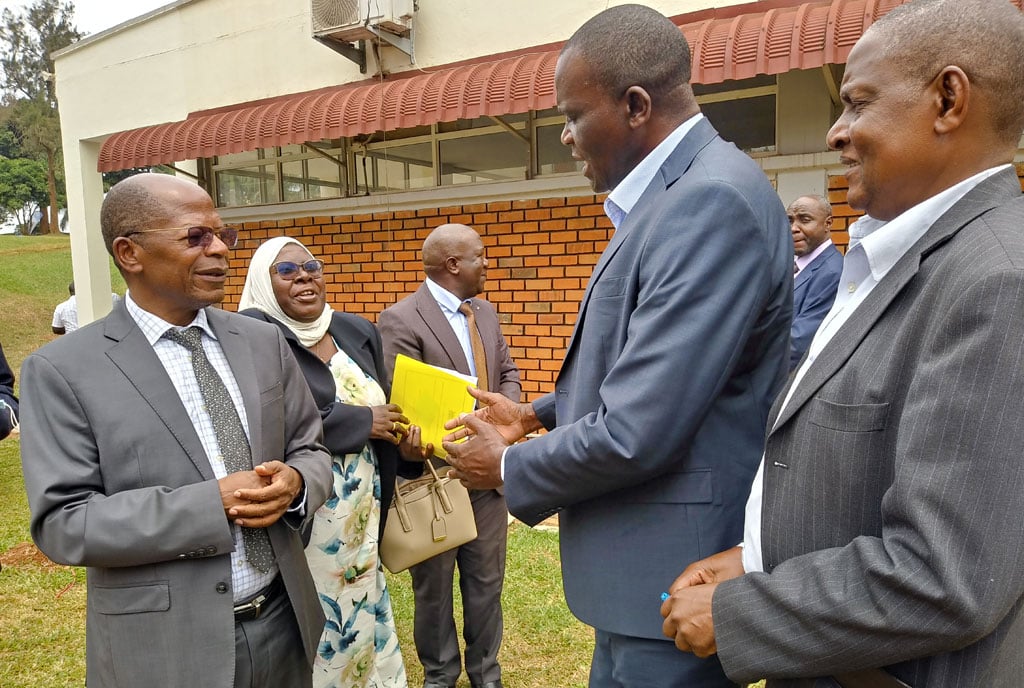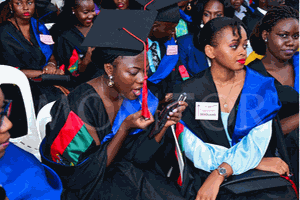
Bachelor of Dental Surgery graduates celebrate during the 74th graduation ceremony at Makerere University on January 29, 2024. PHOTO/FRANK BAGUMA
The government is set to abolish the automatic merit scholarships currently awarded to government-sponsored students at various institutions of higher learning, the Monitor can reveal.
This follows concerns that the vast bulk of the scholarships disproportionately benefit children from wealthy families, particularly those studying in elite schools in urban districts such as Kampala, Wakiso, and Mukono. This usually shortchanges bright but underprivileged students who cannot afford higher education.
Now educationists and policymakers want students who qualify for the scholarships but benefit from getting an education from prestigious schools where school fees is north of Shs3 million not to be considered altogether.
Under a new Higher Education Policy currently at consultation stage, there is a proposal to replace the automatic scholarship system with a merit-based grant system. The policy, which the Monitor has seen, christens the system as the National Excellence Scheme. If green-lit, the scheme will target top performers at the Uganda Advanced Certificate of Education (UACE) level or its equivalent.
Paradigm shift
In an interview with the Monitor, Mr Brighton Barugahare, the commissioner of the Education and Research Department, indicated that once the draft policy is approved by the Cabinet and Parliament, the scheme will require top-performing students at UACE to apply for financial support instead of receiving it automatically. This shift aims to create a fairer system where bright but financially disadvantaged students can access higher education.
“We are shifting from government scholarships to grants, where students will have to apply for financial support,” Mr Barugahare said.
“We are ending the practice of giving students what they do not want. Some students would be awarded scholarships for education courses but later switch to engineering, as their parents can afford the costs. This left scholarship slots unused, yet they could have gone to those truly in need,” he added.
According to Mr Barugahare, some recipients usually opt out of scholarships extended to them in favour of costly and, perhaps, more prestigious courses available on the private scheme. This means that scholarships that would have been taken up by poorer students go to waste.
Currently, the government sponsors 4,000 students distributed across all public universities. Makerere University takes the lion's share with beneficiaries numbering 1,700.
Warm reception
The move has been welcomed by educationists and the general public, who indicated that this has been long overdue.
Prof Buyinza Mukadasi, the deputy Vice Chancellor for Academic Affairs at Makerere University, welcomed the proposal. He told this publication that the Public Universities Joint Admission Board (PUJAB) is ready to put in place a verification team to ensure that the best students with economic hardships receive these scholarships.
“For quite a long time, the public has raised concerns about the government scholarships because those benefiting have been coming from rich families who can afford education. The system that was used had hidden consequences and was not fair enough,” Prof Mukadasi said.
Dr James Nkata, the vice chairperson of the Public Universities Forum, equally welcomed the proposals, noting that only the bright and poor should access the grants.
“The government is going in the right direction because the scholarships were meant to help the bright poor. The students currently admitted were coming from high-profile schools like Gayaza and Namilyango, whose parents can afford education at the expense of the bright students from rural schools,” Dr Nkata said.
“The grants will promote equalisation of opportunities where both the rich and poor will access better education,” he added.
Dr Nkata further said the proposed grants are well-deserving because people will apply for them.
“We shall ensure that the verification teams conduct fact-finding to establish the performance and economic hardship of students who have applied. The grants will go to the most deserving,” he reasoned.
Push for change
Legislators sitting on the Education Committee and Deputy House Speaker Thomas Tayebwa have always implored the government to abolish these scholarships.
In 2022, Mr Tayebwa asked the National Council for Higher Education (NCHE) to lead a review of the government scholarship system to ensure it benefits children from poor backgrounds.
Mr Tayebwa expressed concern that the current system favours students from well-off families and prestigious schools, leaving out those in rural areas who are most in need of financial assistance for higher education.
He pointed out the growing inequality in education access between children from rich and poor families.
“I have a child at Namilyango and another at St Mary's College Kisubi, but, when I look at the fees I pay, it is almost twice that paid at public universities, and yet these are the schools from which most students are given government sponsorships, yet their parents are rich,” Mr Tayebwa said during the 13th Blended Higher Education Institutions Exhibition.
“Why should my child be given government sponsorship when I can pay the money? We should open opportunities for all,” he added.
Mr Tayebwa urged the NCHE to collaborate with the House Education Committee to either reserve government scholarships for children of the poor or transfer them to the study loans scheme, allowing students to borrow and pay later.
Sponsoring graduate students
We also understand the government plans to expand its support for students in higher education by including graduate students in its funding programmes. Currently, the sponsorship is limited to undergraduate and diploma students.
There have been calls for the Ugandan government to sponsor graduate students, with several stakeholders, including educationists, university officials, and students, advocating for the expansion of government sponsorship to include postgraduate programmes.
They argue that while the government provides scholarships for undergraduate students, there is limited support for graduate students despite the increasing need for advanced skills and expertise in the country.
The number of Ugandan academics with doctoral degrees remains low because very few individuals have pursued this level of education due to the cost and time commitment involved. Prof Mukadasi indicated that to pursue a PhD, individuals require between Shs200m to Shs400m, which the majority cannot afford.
“Tuition fees charged on graduate students, including masters and PhD programmes, are higher than those paid by undergraduate students. Many students thus opt to stop at the bachelor level because by the time they reach graduate level, their resources have depleted,” Prof Mukadasi said.
Mr Barugahare indicated that the move by the government to start sponsoring graduate students ,should the policy be passed, aims to fill the gap of PhD holders in the country. According to him, professors in public universities are required to retire at the age of 60, but due to the shortage, they have been allowed to continue in service up to the age of 70 to fill the gap.
Previously, Prof Mary Okwakol, the executive director of the NCHE, had implored the government to increase funding for PhD students in Uganda. She highlighted the need to boost the number of highly qualified lecturers in higher education institutions.
Prof Okwakol also noted that only 1,900 out of the 12,000 lecturers and tutors employed in higher institutions of learning hold PhDs. This, she added, is very low and henceforth urged the government to reinstate scholarships for PhD students. She emphasised the critical role they play in advancing research and supervising master’s students at universities.
“Years ago, the government used to sponsor PhD students, but these scholarships were abolished. The government should review this because of its importance in developing and leading research, as well as supervising master’s students at the university level; hence, their importance cannot be underrated,” Prof Okwakol said.
She also pointed out that some universities, like Makerere University, do not hire lecturers without a PhD, and as a result, Makerere holds about 50 percent of the country’s PhD holders.
A PhD or Doctor of Philosophy is the highest academic degree awarded by universities in most fields of study.
'Tread carefully'
Whereas Mr James Kubeketerya, the chairperson of the parliamentary Education Committee, was not privy to this proposed policy, he expressed mixed reactions regarding it, stating that the proposal has both merits and demerits.
According to him, the scholarships were awarded based on merit, and students worked hard for them, warning that abolishing them completely and replacing them with grants would discourage those who have been working hard.
Mr Kubeketerya emphasised that while people have expressed views on the scholarships, the government should tread carefully, as the proposal has both merits and demerits
"Previously, we did not have private sponsorships; students who failed to secure government scholarships were required to repeat their studies. When private slots opened up, students who did receive scholarships would privately sponsor themselves. This scheme has promoted hard work among students. Removing it will not encourage diligence," he said, adding that they will discuss the policy further when it goes to the House.
Other proposals
The government also aims to establish regional universities and tertiary institutions to cater to the diverse educational needs across the country. This move will align degree-awarding institutions with universities, either as constituent colleges or fully-fledged universities.
Further, the government also plans to establish a national research fund to support research and innovation in higher education institutions. This fund is expected to enhance academic work and promote innovation by both students and staff.
Currently, the government gives research funds only to public universities. Makerere University gets the lion share of about Shs20 billion annually, with other universities also getting some money subsequently.
Going forward, both the private and government institutions will be required to apply and compete for the research funds, with the government saying that all students including those in both government and private schools belong to the government hence all institutions must benefit.
Additionally, the government plans to promote Science, Technology, Engineering, and Mathematics (STEM) programmes by reforming the assessment of secondary school learners. Affirmative measures will also be put in place to ensure that both boys and girls have equal access to higher education, addressing the existing gender imbalances.
Graduates celebrate during the 74th graduation ceremony at Makerere University on January 29. The government is set to abolish the automatic merit scholarships currently awarded to government-sponsored students at various institutions of higher learning.
OUTLINED PROPOSALS
• Provide grants under the National Excellence Scheme for top UACE performerss.
• Expand support to include graduate students alongside undergraduate and diploma students.
• Establish regional universities and tertiary institutions to meet local higher education needs.
• Rationalise degree-awardinginstitutionss, aligning them with universities or upgrading them to fulluniversitiess.
• Create a National Research Fund to support research and innovation at higher education institutions.
• Conduct regular market scans to inform curriculum design based on new skills, knowledge, and technologies.
• Expand enrolment in STEM programmes through reforms at the secondary school level.
• Implement affirmative actions to ensure gender balance in higher education access.
• Offer student loans to financially needy students under the Higher Education Financing Scheme.
• Establish centres of excellence for specialised education and training.
• Support higher institutions in delivering research and innovation to communities through Knowledge Transfer Partnerships (KTPs).
• Regulate private higher education institutions to meet national human capital needs




